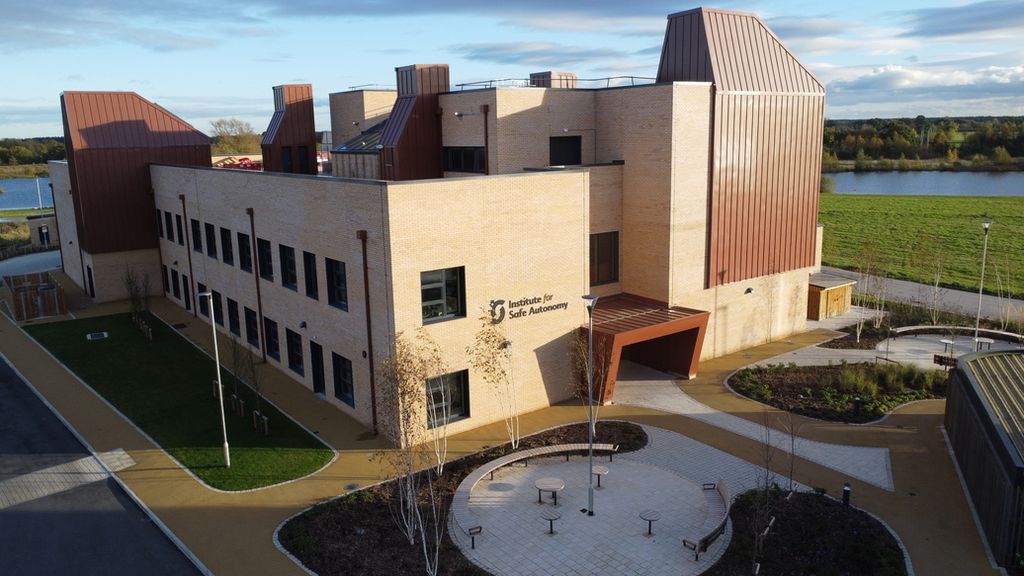Internet Explorer, Chrome Browser, Firefox Browser, Safari Browser
Press Release31 March 2023Smart InfrastructureZug
University of York appoints Siemens to deliver solar farm as part of £1.5 million research project

The University of York, England
The 193 kWp
solar farm will create a ‘living lab’
to give insight to landowners and operators of solar farms on how best to
integrate robotic technology in the field.
The
project will also enable the Institute to become energy self-sufficient by
2025, generating approximately 170 MWh of power annually.
The farm,
which spans more than 1,400 square metres, will consist of a range of different
panel configurations including static ground installations and sun-tracking arrays.
Solar panels will also be deployed on the side of
the Institute’s building and the rooftop to maximize light exposure.
Following
successful completion of the design phase, installation work will be carried
out on site by specialist installer Lynx, with the project expected to be fully
operational by July.
“The
University’s Institute for Safe Autonomy provides a first-class ecosystem for
research and innovation in the world of robotics and connected autonomous
systems,” said Patrick Reilly-O’Donnell, Head of Project Execution at Siemens.
“As we continue to integrate autonomous technology into our everyday lives, understanding
how we can safely deploy them to maximize efficiencies within those sectors
connected to the green transition is becoming increasingly important.”
“Robotics,
autonomous systems and AI have the potential to transform the way we live,
travel and work in the future. Integrating them with the production of
renewable energy will ultimately play a key role in the journey towards net
zero,” said Professor Miles Elsden, Director of the Institute for Safe Autonomy
at the University of York. “This innovative research project marks an important
milestone for the Institute and reaffirms our commitment as a university to
sourcing sustainable energy."
The
Institute for Safe Autonomy (ISA) is a new initiative at the University of York
which takes a safety critical approach to the design, development and testing
of robotics and connected autonomous systems. ISA’s purpose-built facility
combines a range of experimental laboratories and test spaces where academics
from across the University work closely with industry, government and
third-sector partners to explore trustworthy solutions to real-world problems.
For this press release
Follow us on Twitter
Siemens Smart Infrastructure (SI) is shaping the market for intelligent, adaptive infrastructure for today and the future. It addresses the pressing challenges of urbanization and climate change by connecting energy systems, buildings and industries. SI provides customers with a comprehensive end-to-end portfolio from a single source – with products, systems, solutions and services from the point of power generation all the way to consumption. With an increasingly digitalized ecosystem, it helps customers thrive and communities progress while contributing toward protecting the planet. Siemens Smart Infrastructure has its global headquarters in Zug, Switzerland. As of September 30, 2022, the business had around 72,700 employees worldwide.
Siemens AG (Berlin and Munich) is a technology company focused on industry, infrastructure, transport, and healthcare. From more resource-efficient factories, resilient supply chains, and smarter buildings and grids, to cleaner and more comfortable transportation as well as advanced healthcare, the company creates technology with purpose adding real value for customers. By combining the real and the digital worlds, Siemens empowers its customers to transform their industries and markets, helping them to transform the everyday for billions of people. Siemens also owns a majority stake in the publicly listed company Siemens Healthineers, a globally leading medical technology provider shaping the future of healthcare. In addition, Siemens holds a minority stake in Siemens Energy, a global leader in the transmission and generation of electrical power.
In fiscal 2022, which ended on September 30, 2022, the Siemens Group generated revenue of €72.0 billion and net income of €4.4 billion. As of September 30, 2022, the company had around 311,000 employees worldwide. Further information is available on the Internet at www.siemens.com.
In fiscal 2022, which ended on September 30, 2022, the Siemens Group generated revenue of €72.0 billion and net income of €4.4 billion. As of September 30, 2022, the company had around 311,000 employees worldwide. Further information is available on the Internet at www.siemens.com.